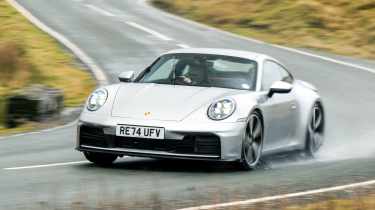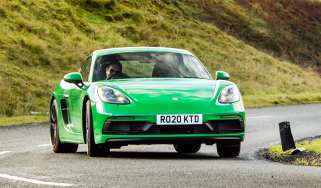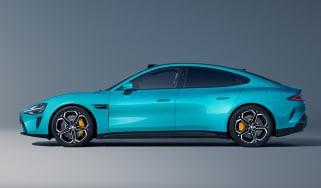Porsche 911 (992.2) – ride and handling
Still feels like a proper 911, but only delivers those familiar sensations when you’re driving hard
The 992.2 is more mature than ever, while this might worry purists, it remains a fantastically capable and versatile sports car that punches above its weight – as the 911 always has. Admittedly, older 911s deliver more sensations to the driver more of the time, but by modern standards (and in comparison to rivals like BMW’s M4 Competition) the 911 still feels connected and intuitive in a way that speaks to the decades of development Porsche has lavished on it.
This becomes more apparent as you up your pace and commitment, and typical 911 traits come through. Switch the PDK to manual mode and hang on to lower gears, and the 3-litre turbo engine feels more enthusiastic, unleashing a satisfying flat-six howl and excellent throttle response. The brakes are strong and progressive, and there’s a good sense of load through the steering as you lean on the tyres into a corner. On the way out you can get on the power good and early, knowing that the rear tyres will hook up and launch you down the next straight. This feel and capability makes it supremely effective in the wet, too.
The character shift brought by the GTS’s hybrid powertrain is stark, but in all the right ways. It feels like a mix of elements of Turbo and GT3, with its standard-fit chassis upgrades giving fantastic precision and incisiveness. It’s firmer than the Carrera and more reactive to surface imperfections, but there’s extra crispness to the way it steers and the way the chassis responds at speed, the body settling quickly and leaning into the grip from the outside tyres. The responsive and more muscular engine also gives you more freedom to neatly adjust and balance the car through a corner – it all culminates in a rich driving experience that shuns any notion that the 992 isn’t a true sports car.
More reviews
To a greater extent, the same is true of the GT3. Despite being hobbled by more stringent noise and emissions regulations, the 992.2 still feels as raw and spectacular as the previous-generation car, but with S/T-inspired upgrades bringing a higher level of polish and capability. It remains a grippy and intense track car, but also one that’s malleable and playful over the limit, and totally absorbing on the road (if a little too raw in its most lightweight spec).
A manual transmission is, of course, an important additive to the 911’s viscerality, bringing an inherently more connected experience that no automatic transmission can offer. The Carrera T's meaty, satisfying six-speeder makes for a more absorbing, less clinical driving experience than a Carrera, and there's extra rawness and edge from its specially-tuned, 10mm lower suspension and reduced sound deadening. The ride can be tough on bumpy roads but it feels more connected and that bit more exciting than the base car.
As a GT, the 992 is more usable and refined than previous models, but still falls short of being able to morph into a truly cosseting cruiser – particularly in T spec. There’s still plenty of characteristic 911 road roar, but wind and engine noise are well suppressed. And while the ride is quite firm at low speeds, it seems to improve as your velocity increases. Of course, the models most likely to lean into an everyday role are the Cabriolet and Targa – we’ve driven the latter, and while it lacks the ultimate sharpness and sense of cohesion of the coupe, there’s still real depth to its ability and it gets better the harder you drive. The only major disappointment is the buffeting you get at motorway speeds with the roof stowed away, which almost defeats the point of having a Targa in the first place.
Is the best yet to come from the 992.2? Perhaps. The outgoing GT3 RS took top honours at both eCoty 2023 and TCoty 2024. The Turbo, meanwhile, could receive a welcome injection of sound and character if it adopts a similar powertrain to the latest GTS.




